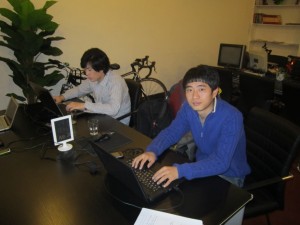Beijing's tech-firms find workspace, for the price of a coffee

BEIJING -- Some call the Zhonguancun area of Beijing China’s Silicon Valley, but on first inspection it seems a far cry from the San Francisco Bay. Cavernous markets, packed with vendors hawking cut price phones and computers, dominate the area.
Su Di, owner of The Garage, an “innovation and investment themed" cafe, is determined to push Zhonggauncun in a more creative direction. The Garage was set up as a space for young technology start-up companies to work and swap ideas. “We provide an office space, for the price of a cup of coffee,” he said.
Since it opened, the cafe has become a hub for Beijing’s tech entrepreneurs, who tap at notebook computers, sip tea and exchange name cards, as Phil Collins' “Against All Odds” drifts out from computer speakers.
Since The Garage opened this April, more than 20 start-ups have made regular use of the facilities. Most are either software or webdesign companies, but there have been some more leftfield ideas: one firm invented a healthier kind of cooking oil. “It’s much cheaper to work here than renting an office” Mo Xiaoyi, a 23 year old founder of Luyi.com, a company developing GPS powered software which allows companies to keep track of employee’s travel expenses, said.
The cafe is also a place where entrepreneurs can meet potential “Angel” investors, who provide capital to start-up firms. “Start-ups often don’t really understand what investors are looking for, so we help them with that,” Su Di said. Ten start-ups have managed to find investors through the cafe, he said.
These include 23 year old Xiao Yi, who quit his job in a large tech-firm in Southern China, and moved to Beijing to found his own company in 2009. Xiaoyi and his four person team set up shop in the Garage, and he

endured a daily commute of over 90 minutes to reach the cafe each day, until he met an investor over coffee, and was able to move into an office of his own.
“An investor came to the cafe to look around, and we spoke for a few minutes,” Xiaoyi said. A few days later, he signed an agreement securing investment of over 2 million RMB. “We just had a couple of meetings in the Garage,” he said. “At the time we hadn’t even prepared a proper powerpoint presentation,” he said.
The Garage’s entrepreneurs are truly innovative, Su Di insists. One company, Softbooks, created an app for tablet computers which provides the soft lighting needed in by photographers when developing photographs in dark rooms. “After they released the application, it was the American companies who copied them” he said. “If someone rips off my idea, I’ll know I’m doing well” Xiaoyi said.
The Garage’s customers agreed that Zhonggauncun still has a long way to go before it can compete with tech-centers like Silicon Valley. “There are enough investors, but a shortage of tech talent” Jay Li, one investor said. He blames the low quality of most Chinese university education, and the fact that Chinese students who study abroad are reluctant to return to Beijing and found their own companies.
Promising graduates from China’s universities usually prefer the safety of working for big firms to founding their own. Xiaoyi had a hard time telling his parents he was giving up his job to strike out alone. “At first my parents weren’t pleased with my decision,” Xiaoyi said. “It took me over a month to persuade them to support me.”
Su Di says he doesn’t profit from running The Garage. “I just want to do something to help entrepreneurs, before I get too old,” he said.
The Garage has already attracted the attention of City governments in other parts of China “I was asked to found a similar cafe in Shanghai,” Su Di said. “But I don’t want to expand too fast." He hopes that the local government will step in with funds to keep The Garage running. And the comparisons with Silicon Valley? “We have a long way to go,” he said.
Pictures: Author.
This post was originally published on Smartplanet.com
